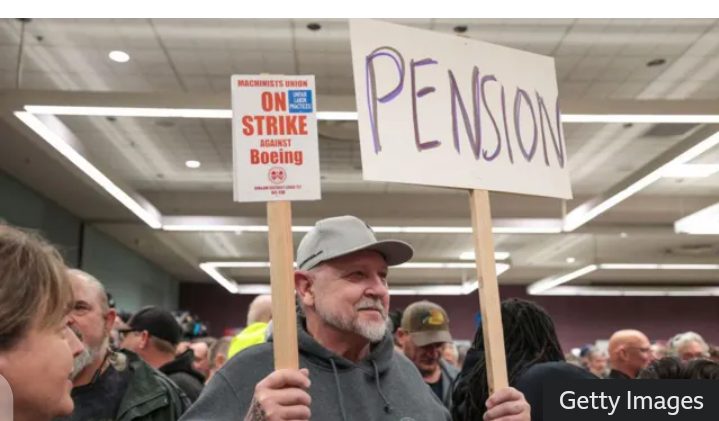Boeing Strikers Set To Vote On 35% Pay Rise Offer Amid Ongoing Dispute.
Boeing has proposed a 35% pay rise over four years to its striking machinists, in an effort to end a month-long strike that has brought the company’s production to a halt. Approximately 33,000 unionised workers, mainly based in Seattle, will vote on Wednesday to decide whether to accept the new contract offer.
The workers, who have been on strike since 14th September, are responsible for the production of Boeing’s 737 MAX, 767, and 777 planes. The strike has significantly impacted the company’s operations, leading Boeing to announce earlier this week that it is seeking an additional $35bn in funding. The company has also revealed plans to lay off 17,000 employees—about 10% of its workforce—by November, if the situation remains unresolved.
“The future of this contract is in your hands,” the union advised its members on Saturday, as it prepares for the crucial vote.
Union workers had previously rejected an offer that included a 30% pay rise, arguing that it fell short of addressing rising living costs. The union, represented by the International Association of Machinists and Aerospace Workers Local 751, has been advocating for a 40% pay increase and the reinstatement of a defined-benefits pension, which would guarantee set retirement payments.
While the latest proposal is closer to the desired pay increase, it does not include the defined-benefits pension. However, it does offer a $7,000 (£5,365) bonus for accepting the deal, reinstated incentives, and increased contributions to retirement plans. This includes a one-time $5,000 payment and up to 12% in employer contributions.
The strike has drawn the attention of the Biden administration, with Acting US Labour Secretary Julie Su meeting union representatives and Boeing executives in Seattle this week to encourage a resolution. Boeing plays a critical role in the US economy, and the ongoing strike has raised concerns about its broader impact.
Boeing has also been under heightened scrutiny following a series of incidents, including a defect in January that caused a panel to blow out on a new Alaska Airlines Boeing 737 MAX shortly after takeoff. The Federal Aviation Administration (FAA) has since barred Boeing from increasing production and opened a new safety inquiry last week. In July, Boeing agreed to plead guilty to criminal fraud charges, paying $243.6m (£187m) in connection with two fatal 737 MAX crashes that occurred over five years ago, claiming 346 lives.
As negotiations continue, the outcome of the workers’ vote on Wednesday will determine the next steps in this high-stakes dispute.



